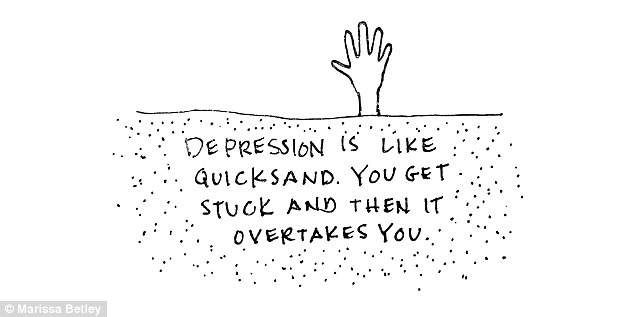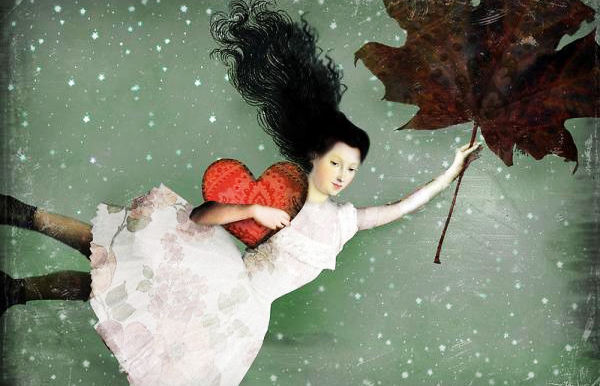pain
The Real Reasons Why Generation Y Is Depressed And Silent About It

Illustrated depictions of depression by artist Marissa Betley
We hear this a lot: Follow your dreams, follow your passions, you will know when it’s the right time.
But will I really know when it’s the right time?
I keep asking myself this because while I believe in following one’s heart, there’s a great deal of hay to look for the needle through until we reach the core of our aspirations.
21 year old photography wonder child Olivia Bee spoke at TEDX and said aspirational compromise is for pussies. I don’t know how many people can actually afford to non compromise. Because when you are struggling, when you are poor, when you are geographically challenged in pursuit of personal hopes and dreams, comes a reminder that motivational speech can set up increasingly high standards for the self and unrealistic expectations. Meaning that not everybody will be able to travel around the world with their art, be discovered suddenly and become famous. Not everybody will land their dream job or become a successful owner of their business. Not everybody will marry the love of their life and not everybody will even meet that special person. Last but not least, not everybody will become sick or struggle for their life, but chances are, the expectations versus validation system that we’re bloating might crack a few bones here and there.
Generation Y has suffered widely of this new scale of values, becoming a paradox of living with constant discontentment while hunting high for reassurance, validity and recognition. Being special has become the norm, while being “ordinary” gets often stamped as being useless to society.
Put big hopes in the same pot with a low self esteem and a fascination for success and you will have the magic lotion. Depression hits hard when the personal dream ceases to match the actual reality, and brings upon much more than a fleeting desire for validation.
Depression has become outspoken and gained popularity with the rise of the Y generation because the internet has facilitated making one’s voice heard. It has also lessened the barriers of communication, thus a global issue has now global support. But unlike cancer, unlike any other fatal disease, mental deprecation still bears a certain amount of stigma that puts depression in a position where it has to be justified.
Depression is complex, and most often than not, hits lower than the average low on those suffering poverty, discrimination or disease. Depression does not discriminate though, and efforts are continuously made towards its acceptance on a social level as a very common, legitimate affection that needs to be treated accordingly. The stigma that comes around with depression hits people from all walks of life, regardless of ethnicity, life goals and success.
Cal Newport pointed out that “follow your passion” is a catchphrase that only grew in popularity over the last 20 years, according to Google’s Ngram viewer, a tool that shows how prominently a given phrase appears in English print over any period of time. This same tool explains how the phrase “a secure career” has become less fashionable, while “a fulfilling career” is going the distance.
We asked our young followers to speak openly on the reasons why we keep silent about depression and we found out this:
Talking about depression has become so much harder now that people think it’s cool to say “I’m depressed.” There are very many things that are actually emotionally and physically taxing being romanticized these days, and I found it extremely hard to talk about my anxiety, for instance, because on one hand there is the stigma of being mocked and picked on for being “dramatic” and on the other, the instinctual reaction people have when you share something so intensely personal, to say “I know, I’m depressed too.” I’m not saying they don’t feel those things in phases, I’m sure they do, but the difference is that when you’re suffering from depression or anxiety, it isn’t just a phase. It colours every single thing you do, every moment of each day. You can’t just shake it off. – Tanvi Deshmukh
We are afraid to give shape and words to things that scare us. Once verbalized, it becomes a stigma. Depression is a stigma no matter how many suffer from it. No matter how many speak about it – they all speak through stories, that are mostly anonymous or just unknown. Cristina Hiraeth
Depression is a delusion. It is the philosophy of a cancerous cell. It produces nothing other than low moments in life. Depression results in insecurity, lack of confidence and procrastination. To live in depression is to live in an emotional failure. Depression leads to uncontrollable anxiety which in turn leads to irrational thinking. This actually sabotages the effort of the victims in solving the matters arising. How then can we cleanse the Augean Stables of depression? The normal response to it is to be an Escapee. Escape will put us in a comfort zone temporarily while the cause of the depression remains. Not because we are depressed, but because we feel that Post-Traumatic Stress Disorder is insurmountable. Who can claim immunity to depression? None I took a guess. Depression removes us from comfort zone and entangled us in the cobweb of lonesome world. Depression is a daylight robbery and the only panacea for it is to nail its coffin through SELF – Pen Corp Realm
Because we know so little about consciousness and will probably never understand it completely. Because psychiatry and psychology are relatively new topics in the scheme of things. Because psyche constitutes our identity, a problem with it seems to strike at the very core of what we think we are. The huge level of anxiety associated with that makes any problem look like an OFF switch. […] Evolution will deal with this too. – Alexandru Chirita
Because social media has given us the impression that everybody else is happy and we feel misunderstood because nobody else can feel the pain we go through. We don’t want to bother people with our problems and write them off as petty so we don’t talk about them at all so not to burden the people close to us. – Davor Sopar
In a world where you are a misfit if you do not portray yourself as a bright ray of sunshine, talking about depression is considered something ugly. Also, we as a part of this generation, are afraid ourselves to know the reasons behind the thing that is killing us inside and force ourselves to ignore it, putting up a plastered smile for a selfie. – Nabeela Nushaira Rahman
Because we think it’s something to be ashamed of – Kovacs Bea
What are your feelings on depression and opening up about it? Do you believe aspirational compromise is for pussies?
—
Ioana Cristina Casapu is the Managing Director of Art Parasites Magazine. She likes Brian Eno, airports and never says no to a good old Gin&Tonic.
Read all her stories and poetry here.
Be the first to write a comment.
Your feedback



